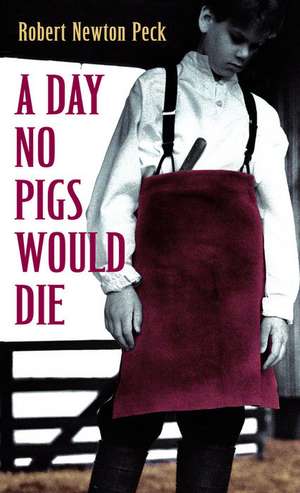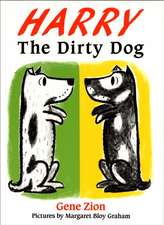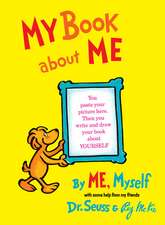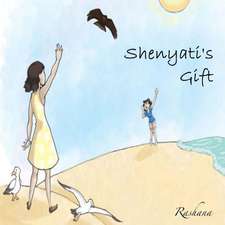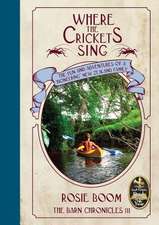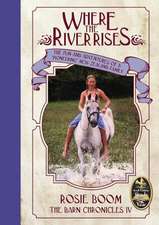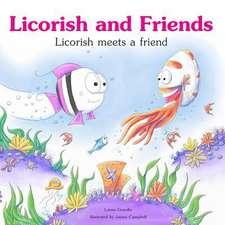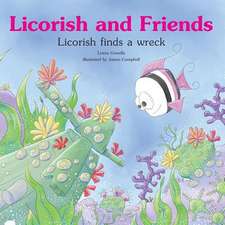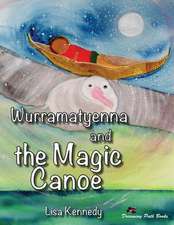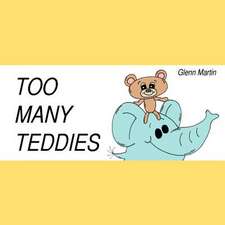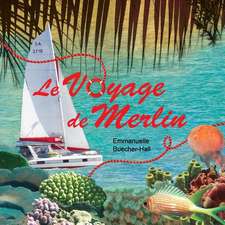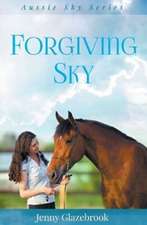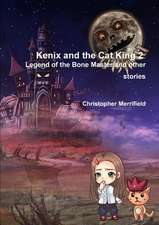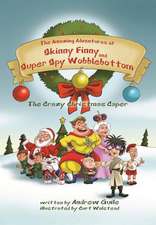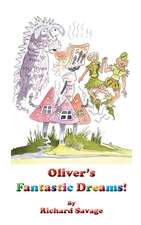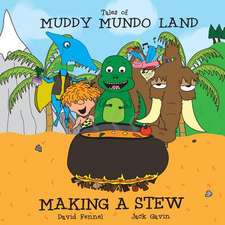A Day No Pigs Would Die: A Day No Pigs Would Die
Autor Robert Newton Pecken Limba Engleză Paperback – 31 aug 1994 – vârsta de la 12 ani
Vezi toate premiile Carte premiată
a Vermont boyhood that is part fiction, part memoir. The result is a moving coming-of-age story that still resonates with teens today.
Preț: 42.04 lei
Nou
Puncte Express: 63
Preț estimativ în valută:
8.04€ • 8.42$ • 6.70£
8.04€ • 8.42$ • 6.70£
Carte disponibilă
Livrare economică 10-24 martie
Preluare comenzi: 021 569.72.76
Specificații
ISBN-13: 9780679853060
ISBN-10: 0679853065
Pagini: 160
Dimensiuni: 104 x 173 x 15 mm
Greutate: 0.09 kg
Ediția:Sprinter.
Editura: RANDOM HOUSE CHILDREN'S BOOKS
Seria A Day No Pigs Would Die
ISBN-10: 0679853065
Pagini: 160
Dimensiuni: 104 x 173 x 15 mm
Greutate: 0.09 kg
Ediția:Sprinter.
Editura: RANDOM HOUSE CHILDREN'S BOOKS
Seria A Day No Pigs Would Die
Notă biografică
Robert Newton Peck comes from generations of Yankee farmers. Like the Vermont folk he writes about in his novel, he was raised as a boy in the Shaker Way, which endured even after the sect itself had died out. Its view of life is embodied in the character of his young protagonist's father, who believed that a faith is more blessed when put to use than when put to word: "A man's worship counts for naught, unless his dog and cat are the better for it."
From the Hardcover edition.
From the Hardcover edition.
Extras
I should have been in school that April day.
But instead I was up on the ridge near the old spar mine above our farm, whipping the gray trunk of a rock maple with a dead stick, and hating Edward Thatcher. During recess, he’d pointed at my clothes and made sport of them. Instead of tying into him, I’d turned tail and run off. And when Miss Malcom rang the bell to call us back inside, I was halfway home.
Picking up a stone, I threw it into some bracken ferns, hard as I could. Someday that was how hard I was going to light into Edward Thatcher, and make him bleed like a stuck pig. I’d kick him from one end of Vermont to the other, and sorry him good. I’d teach him not to make fun of Shaker ways. He’d never show his face in the town of Learning, ever again. No, sir.
A painful noise made me whip my head around and jump at the same time. When I saw her, I knew she was in bad trouble.
It was the big Holstein cow, one of many, that belonged to our near neighbor, Mr. Tanner. This one he called “Apron” because she was mostly black, except for the white along her belly which went up her front and around her neck like a big clean apron. She was the biggest cow, Mr. Tanner told Papa, and his best milker. And he was fixing up to take her to Rutland Fair, come summer.
As I ran toward her, she made her dreadful noise again. I got close up and saw why. Her big body was pumping up and down, trying to have her calf. She’d fell down and there was blood on her foreleg, and her mouth was all thick and foamy with yellow-green spit. I tried to reach my hand out and pat her head; but she was wild-eyed mean, and making this breezy noise almost every breath.
Turning away from me, she showed me her swollen rump. Her tail was up and arched high, whipping through the air with every heave of her back. Sticking out of her was the head and one hoof of her calf. His head was so covered with blood and birth sop that I had no way of telling he was alive or dead. Until I heard him bawl.
Apron went crashing through the puckerbush, me right behind. I’d never caught up. But because she had to stop and strain, I got to the calf’s head and got a purchase on him.
He was so covered with slime, and Apron was so wandering, there was no holding to it. Besides, being just twelve years old, I weighed a bit over a hundred pounds. Apron was comfortable over a thousand, and it wasn’t much of a tug for her. As I went down, losing my grip on the calf’s neck, her hoof caught my shinbone and it really smarted. The only thing that made me get up and give the whole idea another go was when he bawled again.
I’d just wound up running away from Edward Thatcher and running away from the schoolhouse. I was feathered if I was going to run away from one darn more thing.
I needed a rope. But there wasn’t any, so I had to make one. It didn’t have to be long, just strong.
Chasing old Apron through the next patch of prickers sure took some fun out of the whole business. I made my mistake of trying to take my trousers off as I ran. No good. So I sat down in the prickers, yanked ‘em off over my boots, and caught up to Apron. After a few bad tries, I got one pantleg around her calf’s head and knotted it snug.
“Calf,” I said to him, “you stay up to your ma’s hindside and you’re about to choke. So you might as well choke getting yourself born.”
Whatever old Apron decided that I was doing to her back yonder, she didn’t take kindly to it. So she started off again with me in the rear, hanging on to wait Christmas, and my own bare butt and privates catching a thorn with every step. And that calf never coming one inch closer to coming out. But when Apron stopped to heave again I got the other pantleg around a dogwood tree that was about thick as a fencepost.
Now only three things could happen: My trousers would rip. Apron would just uproot the tree. The calf would slide out.
But nothing happened. Apron just stood shaking and heaving and straining and never moved forward a step. I got the other pantleg knotted about the dogwood; and like Apron, I didn’t know what to do next.
Her calf bawled once more, making a weaker noise than before. But all Apron did was
heave in that one place.
“You old bitch,” I yelled at her, grabbing a dead blackberry cane that was as long as a bullwhip and big around as a broom handle, “you move that big black smelly ass, you hear?”
I never hit anybody, boy or beast, as I hit that cow. I beat her so hard I was crying. Where I held the big cane, the thorns were chewing up my hands real bad. But it only got me madder.
I kicked her. And stoned her. I kicked her again one last time, so hard in the udder that I thought I heard her grunt. Both her hind quarters sort of hunkered down in the brush. Then she started forward, my trousers went tight, I heard a rip and a calf bawl. And a big hunk of hot stinking stuff went all over me. Some of it was calf, some of it wasn’t.
As I went down under the force and weight of it, I figured something either got dead or got born.
All I knew was that I was snarled up in a passel of wet stuff, and there was a strong cord holding me against something that was very hot and kicked a lot. I brushed some of the slop away from my eyes and looked up. And there was Apron, her big black head and her big black mouth licking first me and her calf.
But she was far from whole. Her mouth was open and she was grasping for air. She stumbled once. I thought for sure I was going to wind up being under a very big cow. The noise in her throat came at me again, and her tongue lashed to and fro like a tail of a clock. It looked to me as if there was something in her mouth. She would start to breathe and then, like a cork in a bottle, some darn thing in there would cut it off.
Her big body swayed like she was dizzy or sick. As the front of her fell to her knees, her head hit my chest as I lay on the ground, her nose almost touching my chin. She had stopped breathing!
Her jaw was locked open so I put my hand in her mouth, but felt only her swollen tongue. I stretched my fingers up into her throat- and there it was! A hard ball, about apple-size. It was stuck in her windpipe, or her gullet. I didn’t know which and didn’t care. So I shut my eyes, grabbed it, and yanked.
Somebody told me once that a cow won’t bite. That somebody is as wrong as sin on Sunday. I thought my arm had got sawed off part way between elbow and shoulder. She bit and bit and never let go. She got to her feet and kept on biting.
That devil cow ran down off that ridge with my arm in her mouth, and dragging me half-naked with her. What she didn’t do to me with her teeth, she did with her front hoofs.
It should have been broad daylight, but it was night. Black night. As black and bloody and bad as getting hurt again and again cold ever be.
It just went on and on. It didn’t quit.
But instead I was up on the ridge near the old spar mine above our farm, whipping the gray trunk of a rock maple with a dead stick, and hating Edward Thatcher. During recess, he’d pointed at my clothes and made sport of them. Instead of tying into him, I’d turned tail and run off. And when Miss Malcom rang the bell to call us back inside, I was halfway home.
Picking up a stone, I threw it into some bracken ferns, hard as I could. Someday that was how hard I was going to light into Edward Thatcher, and make him bleed like a stuck pig. I’d kick him from one end of Vermont to the other, and sorry him good. I’d teach him not to make fun of Shaker ways. He’d never show his face in the town of Learning, ever again. No, sir.
A painful noise made me whip my head around and jump at the same time. When I saw her, I knew she was in bad trouble.
It was the big Holstein cow, one of many, that belonged to our near neighbor, Mr. Tanner. This one he called “Apron” because she was mostly black, except for the white along her belly which went up her front and around her neck like a big clean apron. She was the biggest cow, Mr. Tanner told Papa, and his best milker. And he was fixing up to take her to Rutland Fair, come summer.
As I ran toward her, she made her dreadful noise again. I got close up and saw why. Her big body was pumping up and down, trying to have her calf. She’d fell down and there was blood on her foreleg, and her mouth was all thick and foamy with yellow-green spit. I tried to reach my hand out and pat her head; but she was wild-eyed mean, and making this breezy noise almost every breath.
Turning away from me, she showed me her swollen rump. Her tail was up and arched high, whipping through the air with every heave of her back. Sticking out of her was the head and one hoof of her calf. His head was so covered with blood and birth sop that I had no way of telling he was alive or dead. Until I heard him bawl.
Apron went crashing through the puckerbush, me right behind. I’d never caught up. But because she had to stop and strain, I got to the calf’s head and got a purchase on him.
He was so covered with slime, and Apron was so wandering, there was no holding to it. Besides, being just twelve years old, I weighed a bit over a hundred pounds. Apron was comfortable over a thousand, and it wasn’t much of a tug for her. As I went down, losing my grip on the calf’s neck, her hoof caught my shinbone and it really smarted. The only thing that made me get up and give the whole idea another go was when he bawled again.
I’d just wound up running away from Edward Thatcher and running away from the schoolhouse. I was feathered if I was going to run away from one darn more thing.
I needed a rope. But there wasn’t any, so I had to make one. It didn’t have to be long, just strong.
Chasing old Apron through the next patch of prickers sure took some fun out of the whole business. I made my mistake of trying to take my trousers off as I ran. No good. So I sat down in the prickers, yanked ‘em off over my boots, and caught up to Apron. After a few bad tries, I got one pantleg around her calf’s head and knotted it snug.
“Calf,” I said to him, “you stay up to your ma’s hindside and you’re about to choke. So you might as well choke getting yourself born.”
Whatever old Apron decided that I was doing to her back yonder, she didn’t take kindly to it. So she started off again with me in the rear, hanging on to wait Christmas, and my own bare butt and privates catching a thorn with every step. And that calf never coming one inch closer to coming out. But when Apron stopped to heave again I got the other pantleg around a dogwood tree that was about thick as a fencepost.
Now only three things could happen: My trousers would rip. Apron would just uproot the tree. The calf would slide out.
But nothing happened. Apron just stood shaking and heaving and straining and never moved forward a step. I got the other pantleg knotted about the dogwood; and like Apron, I didn’t know what to do next.
Her calf bawled once more, making a weaker noise than before. But all Apron did was
heave in that one place.
“You old bitch,” I yelled at her, grabbing a dead blackberry cane that was as long as a bullwhip and big around as a broom handle, “you move that big black smelly ass, you hear?”
I never hit anybody, boy or beast, as I hit that cow. I beat her so hard I was crying. Where I held the big cane, the thorns were chewing up my hands real bad. But it only got me madder.
I kicked her. And stoned her. I kicked her again one last time, so hard in the udder that I thought I heard her grunt. Both her hind quarters sort of hunkered down in the brush. Then she started forward, my trousers went tight, I heard a rip and a calf bawl. And a big hunk of hot stinking stuff went all over me. Some of it was calf, some of it wasn’t.
As I went down under the force and weight of it, I figured something either got dead or got born.
All I knew was that I was snarled up in a passel of wet stuff, and there was a strong cord holding me against something that was very hot and kicked a lot. I brushed some of the slop away from my eyes and looked up. And there was Apron, her big black head and her big black mouth licking first me and her calf.
But she was far from whole. Her mouth was open and she was grasping for air. She stumbled once. I thought for sure I was going to wind up being under a very big cow. The noise in her throat came at me again, and her tongue lashed to and fro like a tail of a clock. It looked to me as if there was something in her mouth. She would start to breathe and then, like a cork in a bottle, some darn thing in there would cut it off.
Her big body swayed like she was dizzy or sick. As the front of her fell to her knees, her head hit my chest as I lay on the ground, her nose almost touching my chin. She had stopped breathing!
Her jaw was locked open so I put my hand in her mouth, but felt only her swollen tongue. I stretched my fingers up into her throat- and there it was! A hard ball, about apple-size. It was stuck in her windpipe, or her gullet. I didn’t know which and didn’t care. So I shut my eyes, grabbed it, and yanked.
Somebody told me once that a cow won’t bite. That somebody is as wrong as sin on Sunday. I thought my arm had got sawed off part way between elbow and shoulder. She bit and bit and never let go. She got to her feet and kept on biting.
That devil cow ran down off that ridge with my arm in her mouth, and dragging me half-naked with her. What she didn’t do to me with her teeth, she did with her front hoofs.
It should have been broad daylight, but it was night. Black night. As black and bloody and bad as getting hurt again and again cold ever be.
It just went on and on. It didn’t quit.
Recenzii
“Reading this book is like sipping hot cider in front of a crackling potbellied stove. Every page is suffused with wit and charm and glowing with warmth.”–Newsweek
“A lovely book. . . . Honest, moving, homely in the warm and simple sense of the word. . . . It is small, accepting and loving and it succeeds perfectly.”–Boston Globe
“You’ll find yourself caught up in the novel’s emotion from the very opening scene. . . . Love suffuses every page.”–The New York Times
"With plenty of Yankee common sense and dry wit, and some pathos as the boy at 13 takes on the duties of a man. For boys of this age and for the young of any age."--School Library Journal.
"Reading this book is like sipping hot cider in front of a crackling potbellied stove. Every page is suffused with wit and charm and glowing with warmth."-"Newsweek""A lovely book. . . . Honest, moving, homely in the warm and simple sense of the word. . . . It is small, accepting and loving and it succeeds perfectly."-"Boston Globe""You'll find yourself caught up in the novel's emotion from the very opening scene. . . . Love suffuses every page."-"The New York Times""With plenty of Yankee common sense and dry wit, and some pathos as the boy at 13 takes on the duties of a man. For boys of this age and for the young of any age."--"School Library Journal. "
“A lovely book. . . . Honest, moving, homely in the warm and simple sense of the word. . . . It is small, accepting and loving and it succeeds perfectly.”–Boston Globe
“You’ll find yourself caught up in the novel’s emotion from the very opening scene. . . . Love suffuses every page.”–The New York Times
"With plenty of Yankee common sense and dry wit, and some pathos as the boy at 13 takes on the duties of a man. For boys of this age and for the young of any age."--School Library Journal.
"Reading this book is like sipping hot cider in front of a crackling potbellied stove. Every page is suffused with wit and charm and glowing with warmth."-"Newsweek""A lovely book. . . . Honest, moving, homely in the warm and simple sense of the word. . . . It is small, accepting and loving and it succeeds perfectly."-"Boston Globe""You'll find yourself caught up in the novel's emotion from the very opening scene. . . . Love suffuses every page."-"The New York Times""With plenty of Yankee common sense and dry wit, and some pathos as the boy at 13 takes on the duties of a man. For boys of this age and for the young of any age."--"School Library Journal. "
Descriere
This gentle story about a 12-year-old Vermont farm boy "manages to evoke a sense of vanished America--when neighbors were neighborly, when food was home-cooked, and clothes and philosophy homespun" ("Newsweek").
Premii
- Colorado Children's Book Award Winner, 1977
